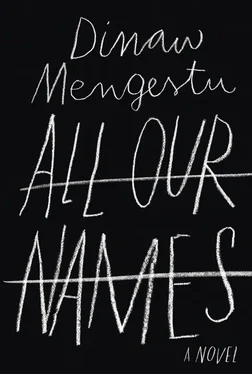It was with this understanding — that we were both liars and frauds, poorly equipped to play the roles we had chosen — that Isaac approached me. We had become part of a crowd gathered around a table in the center of the lawn where one of the boys with the neatly sculpted Afros was reading off a list of demands. Had Isaac and I not been there at the same time, we might have been moved by the young man’s call for better teachers, lower fees, and more freedom for the students, but we had noticed each other right away, and so were never a part of that gathering. All we could see from the moment our eyes locked was the vaguely familiar, possibly hostile face staring back. Perhaps only two men meeting unexpectedly in the middle of a desert after having traveled for so long that they’ve begun to believe the world was uninhabited would know what we felt like. In the province of the slums we meant little to each other. Here we were everything.
Isaac waited for the speech to end. The final words, “This is our university,” were followed by a brief applause. Everything back then was supposed to be ours. The city, this country, Africa — they were there for the taking, and, at least in that regard, our approach to the future was no different from that of the Englishmen who preceded us. Many of the young boys who were students at the university would later prove the point as they stuffed themselves with their country’s wealth.
Once the crowd had thinned, Isaac made his move. He loped. His shoulders descended and rose with each step, almost feral in movement. I felt hunted. I thought, “He’s coming for me,” and though I knew there was no physical injury at stake, I was right in assuming there was something at risk. He stood next to me for a few seconds before he said, “We should go somewhere and talk.”
That sort of conspiratorial language came naturally to him. Over the next few months, I heard him say things such as “We should talk in private,” or “Let’s talk someplace else.” Isaac was gifted at making you feel special.
I nodded my head in agreement. I was victim to his maneuvers from the beginning, instantly folded into his reality, which, for the first time since I came to the capital, gave me the feeling there was at least one place I belonged.
We walked until we were far away from the campus, in a part of the city I had never been in before. Isaac talked the entire time. He had his own version of history — half fact, half myth — which he was eager to share. He began each of his stories with “Did you know,” which was his equivalent of “Once upon a time.”
“Did you know,” he said, “until a decade ago no Africans were allowed to live near the university. This is where the British were planning on building a new palace for the king. If they had lost World War II, they were going to move all the English people here, and this part of the city was going to be just for them. They were going to make everything look like London so they wouldn’t feel so bad about losing. They were going to build a big wall around it and then change all the maps so that it looked like London was in Africa, but every time they started building the wall, someone would blow it up. That’s how the war for independence started.”
I listened, knowing that Isaac’s main intention was to amuse. Whether or not I believed him didn’t matter, as long as I was seduced. We stopped at a café on a street lined with single-story tin-roofed stores selling jeans, T-shirts, and brightly patterned ankle-length dresses. There were similar streets all over the city and across the continent. What made this one unique were the four-story concrete buildings that had recently sprung up in pairs every hundred feet. They had been built quickly, and poorly, to house the private businesses that were supposed to come sweeping into the capital. Their vacancy seemed more meaningful than the crowds and the dozens of other stores standing in their shadows, although it was impossible to know if it was because the empty buildings spoke of the imminent future, or its failure to materialize.
I pointed to a pair with blacked-out windows across the street from us. “And who is supposed to live there?” I asked him.
He stretched out his arms. “Those aren’t buildings,” he said. “Look how ugly they are. Soon everything in the capital will look like that. That’s the government’s secret plan. We built them to keep the British from ever wanting to come back.”
He put one finger to his lip. “This is just between us, of course.”
“Of course,” I said. I didn’t know yet when he expected me to take him seriously.
We took a table outside. Isaac ordered tea for us. When it came, slightly cooler than he wanted, he sent it back and demanded another. He wanted me to be impressed by his ability to command: in this case, a slightly warmer cup of hot water. When the issue with the tea was settled, he crossed his legs, leaned back in his chair, and said, “So — you go to the university, too.”
“Yes,” I told him.
“Every day?”
“Every day.”
It wasn’t until that second exchange that we were certain we were talking about the same thing. Isaac’s face softened. He dropped the constant, half-forced grin he had been wearing since we met.
“My grandfather wanted me to study medicine,” he continued. “But I have other plans of my own.”
“Then what will you study?”
“This is Africa,” he said. “There’s only one thing to study.”
He waited for me to respond. After several dramatic seconds he sighed and said, “Politics. That’s all we have here.”
I hadn’t learned to speak with such false though convincing authority. When Isaac asked me what I planned to study, I had to gather my courage before I could respond.
“Literature,” I told him.
He slapped the table with his hand.
“That’s perfect,” he said. “You look like a professor. What kind of literature will you study?”
“All of it,” I said, and here, for once, I spoke with a bit of confidence, because I believed in what I said. Many of the writers who attended that conference had already begun to make themselves scarce by the time Isaac and I had that conversation: several were already reported to be in exile in America; others were rumored to be dead or working for a corrupt government. But I still dreamed of joining their ranks nonetheless.
When I met Isaac, I was almost what my mother would have called “a woman of a certain age.” That in her mind made me vulnerable, though I never felt that way, not even as a child growing up in a house where it would have been much easier to be a boy. My mother was a whisperer. She spoke in soft tones, in case my father was upset or had entered one of his dark moods, a habit which she continued after he had left. We lived in a quiet, semi-rural Midwestern town, and decorum for her was everything. What mattered most was that the cracks that came with a family were neatly covered up, so that no one knew when you were struggling to pay the mortgage, or that your marriage was over long before the divorce papers were signed. I think she expected that I would speak like her — and maybe when I was very small I did, but my instincts tell me that, more likely than not, this was never the case. I could never have been a whisperer. I liked my voice too much. I rarely read a book in silence. I wanted to hear every story out loud, so I often read alone in our backyard, which was large enough that if I yelled the story at the top of my voice, no one in the house closest to us could hear me. I read out there in the winter, when the tree branches sagged with ice and the few chickens we owned had to be brought into the basement so they wouldn’t freeze to death. When I was older, and the grass was almost knee-high because no one bothered to tend to it anymore, I went back there with a book in my hand simply to scream.
Читать дальше












